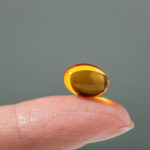By Bonnie Jenkins, Advanced Natural Wellness
We’re barely into the new year, but 2009 is shaping up to be a doozy – especially when it comes to attacks on supplements. The latest involves the joint-health combo glucosamine and chondroitin.
According to researchers at the University of Utah School of Medicine in Salt Lake City, glucosamine and chondroitin – used alone or in combination – won’t do a thing to improve the health of your joints. How accurate is their data? Even the researchers who conducted the study admit that their research is flawed. But that didn’t stop the media from running headlines undermining the well-documented benefits of these two popular supplements.
Better Joints or Junk Science?
In this particular study, 357 people in their mid-50s who suffered from osteoarthritis of the knee were assigned to take either 1,500 mg. of glucosamine, 1,200 mg. of chondroitin, a combination of the two, 200 mg. of prescription Celebrex, or a placebo for 24 months. By the end of the study, the researchers noted that there wasn’t any improvement in joint space narrowing among the different groups. But that isn’t the end of the story. According to those participants with moderate knee arthritis, glucosamine did offer some noticeable relief. Yet that fact didn’t make it into the papers.
Open your arteries, improve blood flow for a new health miracle...
Did you know your circulatory system has over 60,000 miles of arteries, veins and other blood vessels, if stretched end to end?
But as you age, your blood vessels undergo changes, which may cause them to stiffen, thicken and get clogged.
GOOD NEWS! Doctors have now identified a “Miracle Molecule” inside your arteries that helps OPEN your arteries and IMPROVE blood flow.
It’s what Dr. Valentin Fuster calls it, "One of the most important discoveries in the history of cardiovascular medicine."To you, that means...
- Healthy blood pressure
- Sharper mind and memory
- Skyrocketing energy and muscular strength
- Increased pleasure and passion in the bedroom
- Improved circulation to every cell and organ in your body
Go here to discover a new natural way to significantly boost the levels of this miracle molecule in YOUR body NOW!
The study’s design also left much to be desired. According to experts who have studied glucosamine and chondroitin for years, this particular study was both too small and too short in duration. But the most important problem with the study was that the x-ray method they used wasn’t sensitive enough to deliver meaningful results. In fact, it was so erroneous that the margin of error was the same for bone gap loss in the supplemental group as the placebo group. In other words, if the x-rays were measuring weight, it wouldn’t know the difference between a thin person and an obese person. No wonder the researchers themselves questioned the results!
ACE Your Antioxidants
Of course, glucosamine and chondroitin aren’t the only supplements under fire. Vitamins C and E have once again been discounted in a recent issue of the Journal of the American Medical Association. The newest attack centers on whether long-term vitamin E or vitamin C use lowers the risk of major cardiovascular events among men.
The study, which involved more than 14,000 doctors, evaluated whether taking 400 IU of vitamin E every other day and 500 mg. of vitamin C daily protected against heart attack. But, while the study was certainly large enough, the amount of vitamin C and E wasn’t – a fact that was even mentioned on the second page of the study. In fact, it references nine pooled studies that found that a daily dose of 700 mg. of vitamin C resulted in a 25 percent reduction in the occurrence of cardiovascular disease (CVD). But the new study only used 500 mg. per day.
The World's Quickest Solution for Ending Prostate and Urinary Misery
This has recently been revealed to be one of the only real breakthroughs in prostate health.
The seeds of a strange fruit (sometimes called "Chinese Apples") hold powerful phytonutrients that are a revolution in prostate health.
In fact, UCLA and Veterans Administration research have now proved this to be true.
Not only that, but it may be the worlds quickest solution for ending prostate misery.
Simply stated, these phytonutrients represent a huge step beyond beta sitosterol, saw palmetto, and other phytosterols alone.
Simply click HERE if you want to have fast prostate relief...restful, uninterrupted sleep...no more constant "urges to go"...enhanced virility...and optimal prostate support for life.
And then there’s vitamin E. While this study used the standard 400 IU dose, an earlier study by the Harvard School of Public Health reported that taking 600 IU every other day lead to a 22 percent lower risk of a heart attack and slashed the chances of a stroke by 27 percent. Clearly, taking vitamin E on a long-term basis can have a protective effect on your cardiovascular health. But that isn’t the impression you’ll get from this latest study.
One Last Thing …
In a world where 24-hour news is the norm, attention-grabbing headlines are key to high ratings. So instead of ferreting out the real scoop, most news agencies simply opt for the sound bite. And that does a disservice to you, the consumer.
But we can’t blame the media entirely. After all, they are often fed only half the story – and those doing the feeding typically have a financial stake in creating doubt about supplements while bolstering people’s faith in pharmaceutical drugs and surgery. What that means is that, even if a supplement like glucosamine or vitamin E has a mountain of research proving its effectiveness, a few well-placed (if erroneous) headlines can undo years of benefit.
So what’s the true take-away message from this latest round of attacks? Simply this: Don’t take the headlines at face value. Do some digging – or at least approach these reports with a bit of skepticism. And stay tuned – I’ll keep you up to date on everything you need to know about supplements to stay as healthy as you can possibly be!
Research Brief …
If you’ve been dieting and exercising in an attempt to reduce belly fat, you might want to add green tea to the equation. A new study in the Journal of Nutrition reported the outcome of a clinical trial which found that the catechins in green tea reduce abdominal fat and triglycerides in overweight adults. Increased abdominal fat is a factor associated with metabolic syndrome – which significantly increases the risk of diabetes and heart disease.
The trial, which was conducted at Tufts University in Boston, randomized 132 overweight or obese adults to receive a daily beverage containing approximately 625 mg. of green tea catechins or one that didn’t contain any catechins at all for 12 weeks. The participants were also required to maintain the same diet and engage in at least 180 minutes of supervised exercise per week.
By the end of the study, both groups lost weight. But those who received the catechins experienced more weight loss than those who consumed the control beverage. Better yet, the catechin group lost significantly more total abdominal fat and subcutaneous abdominal fat – the fat buried deep within your gut. Plus, their triglycerides were much lower than those in the control group.
Since a cup of green tea contains about 200 mg. of catechins, sipping just three cups a day can provide this fat-burning benefit. Don’t like green tea? Look for a green tea supplement that provides both green tea extract and green tea leaf to ensure that you are getting a variety of catechins, including EGCG, gallocatechin gallate, epicatechin gallate, and catechin gallate.
References:
Cook NR, Albert CM, Gaziano JM, et al. “A randomized factorial trial of vitamins C and E and beta carotene in the secondary prevention of cardiovascular events in women: Results from the Women’s Antioxidant Cardiovascular Study.” Archives of Internal Medicine. 2007;167:1610-1618.
Maki KC, Reeves MS, Farmer M, et al. “Green tea catechin consumption enhances exercise-induced abdominal fat loss in overweight and obese adults.” The Journal of Nutrition. 2008;139:264-270.
Sawitzke AD, Shi H, Finco MF, et al. “The effect of glucosamine and/or chondroitin sulfate on the progression of knee osteoarthritis: A report from the glucosamine/ chondroitin arthritis intervention trial.” Arthritis & Rheumatism 2008; doi: 10.1002/art.23973.
Sesso HD, Buring JE, Christen WG, et al. “Vitamins E and C in the prevention of cardiovascular disease in men: The Physicians’ Health Study II Randomized Controlled Trial.” Journal of the American Medical Associaiton. 2008;300:2123-2133






